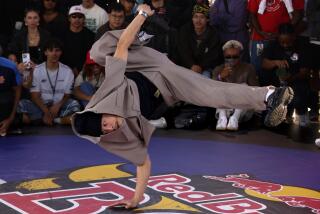Partying Gold Goes to Brazil
- Share via
I’m not sure if I would have found the stamina to make it to Sunday’s gold-medal hockey game if it weren’t for one more jolt from the Brazilian Olympians. They provide more energy than a six-pack of Red Bull.
It was the next-to-last night of the Olympics. Three weeks on the road, three weeks of emptying my pockets and walking through metal detectors, three weeks of the same concession-stand rotation of chicken fingers, pizza and barbecue sandwiches, three weeks of lending Bill Plaschke money and three weeks of late nights running into early mornings had wiped me out.
I was at Natalie’s, a restaurant and bar co-owned by Natalie Williams of the WNBA’s Utah Starzz, and my unofficial evening hangout. It was 10:45 p.m. and I was thinking about setting my personal Olympic record for earliest bedtime.
Then I got a call from Lisa Papandrea, who will be the wife of Brazilian bobsled driver Eric Maleson after a wedding ceremony in the Olympic Village today. She had served as my go-between for a column I wrote on the Brazilian bobsled team and we stayed in touch throughout the Winter Games.
Every time we talked she had new stories. U.S. women’s hockey star Cammi Granato bought one of their Brazilian bobsled team “Frozen Banana” T-shirts. A woman heard Papandrea and Maleson speaking in Portuguese at the Olympic Village coffee shop and joined the conversation; it was Grammy-nominated singer Nelly Furtado.
Papandrea was calling to say the Brazilian athletes were arriving at the Samba Grill at the Gateway Center just across the street.
I went to the Samba Grill, looked around and didn’t see anything. Then they arrived in full flurry, a pack of blue-and-yellow parkas laughing, and beating drums. Athletes, coaches, support staff--about a dozen in all.
They rolled into the restaurant and went straight to a side where various percussion instruments were hanging on the wall. They pulled down drums, tambourines and maracas. But two of the bobsled pushers, Matheus Inocencio and Edson Bindilatti, had their sights set on the biggest drum, about 14 feet off the ground.
Inocencio stood on Bindilatti’s shoulders, someone handed him some wire cutters and he freed the drum.
They paraded to the middle of the restaurant, the rhythm going, the words flowing. Bindilatti spun a tambourine on his finger, tossed it in the air like a pizza-maker, caught it on his finger and kept it spinning. They passed a woman in a wheelchair and gave her high-fives.
I was wide awake. I couldn’t help it. When Brazilians are around, sleepiness just isn’t an option.
They gathered in a circle and various people took turns dancing in the middle. A little American girl used crayons and napkins to make a sign that said “United We Stand,” with the Brazilian and American flags.
The restaurant owner, wait staff and various patrons stood and watched. Others came in from outside to see what was causing the commotion. In the corner, an old man stood up from his crowded dinner table and started dancing.
The whole scene lasted 20-30 minutes. There were autographs, pictures and lots of laughs. Everyone finally put down the drums to eat.
It was past 1 a.m. when the Brazilians trickled out of the restaurant. That didn’t mean they were finished. The party continued on the street corner, as locals came up to play the drums, ask for autographs and pose for pictures.
The Brazilian bobsled team had finished 27th on Saturday. They sure looked happier than the gold medal-winning Germans.
As I left them on the corner with their newfound American friends, I realized that the Brazilians had the best grasp on the concept of these Olympics.
It’s not just an opportunity to compete. It’s an invitation to party.
More to Read
Go beyond the scoreboard
Get the latest on L.A.'s teams in the daily Sports Report newsletter.
You may occasionally receive promotional content from the Los Angeles Times.






